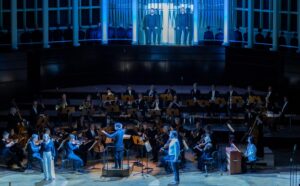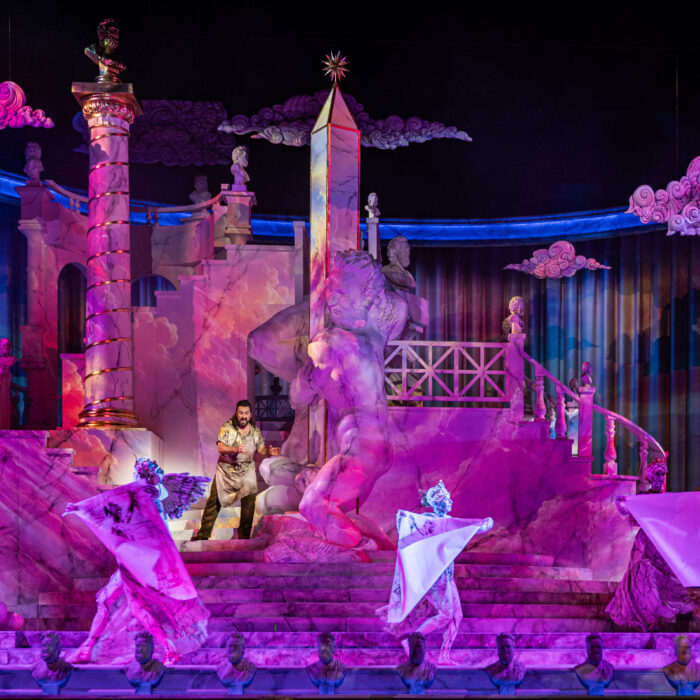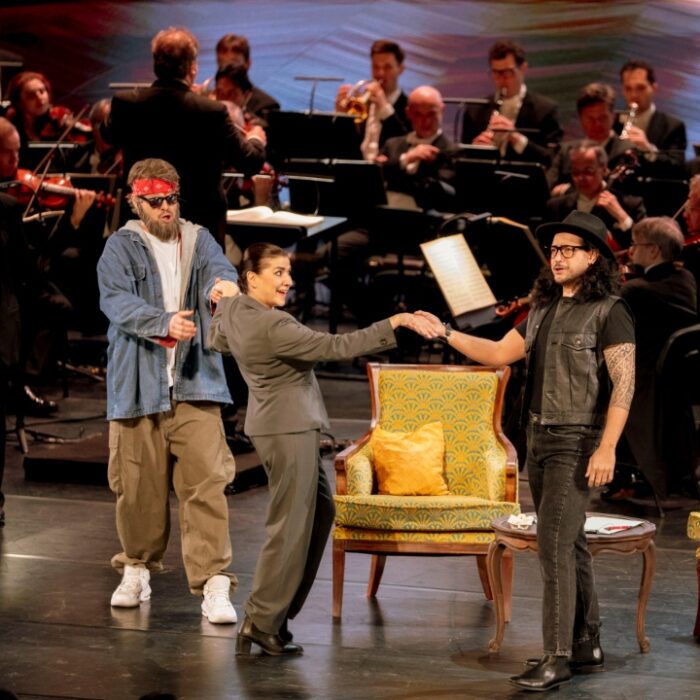
Deutsche Kammerphilharmonie Bremen 2025 Review: Die Zauberflöte (Semi-Staged)
By Mengguang Huang(Photo: Patric Leo)
On a memorable evening, the Deutsche Kammerphilharmonie Bremen, joined by a distinguished cast of soloists, delivered a striking semi-staged rendition of Mozart’s “Die Zauberflöte.” Under the inspired baton of youthful Tarmo Peltokoski, the performance unfolded as a fresh, witty reimagining that captured both its gravitas and playful spirit.
Semi-Staged Production & Visual Details
Director Romain Gilbert’s concept and Hervé Gary’s lighting design proved ideally suited to the acoustically remarkable Elbphilharmonie. The use of vertical LED light sticks placed among the musicians suggested a constellation in which sound and stage dissolved into one another. Other concepts like—spotlights cutting across the hall’s sculpted walls, shadows expanding and retracting—proved surprisingly eloquent. The added thunderclaps and rumbles through the hall’s sound system brought the mythic clashes of day and night, order and chaos, vividly to life.
Orchestral Excellence & Musical Highlights
The Deutsche Kammerphilharmonie Bremen played with its trademark clarity and chamber-like responsiveness. What impressed most was the collective alertness: strings leaning into woodwind colors, brass never overwhelming the singers, and textures that felt constantly alive. Peltokoski’s conducting combined restraint and daring. He often held the orchestra back, before releasing climactic surges with dramatic precision. At just 24, he already shows a remarkable instinct for balance between theatrical pacing and structural coherence: the solemn chords of the Overture set out the opera’s Masonic motifs, which he skillfully wove as guiding signals throughout the evening.
What made this “Zauberflöte” so striking was the rare sense of ensemble they collectively achieved. It was, in the truest sense, a company performance. Highlights were countless—voices blending, energies aligning, dramatic intentions shared—that gave the evening its distinctive glow.
Manuel Winckhler as Sarastro was firmly anchored, his bass warm and authoritative, especially in “O Isis und Osiris.” He projected authority without stiffness, which gave the role unusual humanity. Mauro Peter as Tamino sang with lyrical grace and earnest conviction. His “Dies Bildnis ist bezaubernd schön” floated with tenderness, and his interaction with Pamina had a natural, unaffected warmth.
Kathryn Lewek as Queen of the Night, a role she has made something of a calling card, was predictably dazzling. In this space’s particular acoustic, her pinpoint high notes seemed almost otherworldly, especially when paired with the hall’s storm-like effects. She embodied not just fury but a majestic grandeur that drew spontaneous cheers.
Elsa Dreisig as Pamina was a highlight of the evening. With a luminous soprano that balanced tenderness and inner resilience, she captured both the vulnerability of youth and the quiet strength of a heroine in her own right. Her dual identity as the Queen’s daughter and as Tamino’s partner in love and growth was rendered with touching sincerity. The warmth of her tone, combined with her emotional shading made her portrayal deeply affecting.
Äneas Humm as Papageno was a delight: earthy, funny, and genuinely touching in his yearning for companionship. His baritone had a rustic warmth that made him instantly endearing. Miriam Kutrowatz as Papagena, though appearing late, sparked immediate chemistry with him. Their interplay brimmed with charm and comic timing. Andreas Conrad as Monostatos avoided caricature, retaining menace without becoming cartoonish. The Three Ladies—Silja Aalto, Iris van Wijnen, and Marie Seidler—blended voices with elegance, enriching the Queen’s scenes with a sheen of luxury.
The choral contributions were another high point. Chorwerk Ruhr, under Michael Alber, sang with power and clarity, while the crystalline voices of the St. Florianer Sängerknaben lent an angelic radiance to the temple scenes. Together, they heightened the opera’s aura of ritual and transcendence.
As a centerpiece of the Hamburg Summer Festival, this production honored Mozart’s masterpiece while adding freshness, wit, and inventiveness. The stellar cast, vibrant orchestra, and imaginative staging combined to create an unforgettable evening—a lively testament to the enduring magic and playful brilliance of “Die Zauberflöte.”
Categories
Reviews


